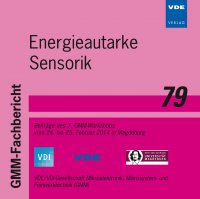Design, Implementation, and Verification of an Energy Autarkic, RF-based Water Meter with Energy Aware Routing
Konferenz: Energieautarke Sensorik - Beiträge des 7. GMM-Workshops
24.02.2014 - 25.02.2014 in Magdeburg, Deutschland
Tagungsband: Energieautarke Sensorik
Seiten: 5Sprache: EnglischTyp: PDF
Persönliche VDE-Mitglieder erhalten auf diesen Artikel 10% Rabatt
Autoren:
Sikora, Axel; Werner, Rico; Lehmann, Peter; Grafmüller, Jan Oliver (Labor Kommunikationselektronik, Hochschule Offenburg, 77652 Offenburg, Germany)
Inhalt:
Efficient, secure and reliable communication is a major precondition for powerful applications in smart metering and smart grid. This especially holds true for the so called primary communication in the Local Metrological Network (LMN) between meter and data collector, as the LMN comes with the most stringent requirements with regard to cost, range, as well as bandwidth and energy efficiency. Until today, LMN field tests are operated all over the world. In these installations, however, energy autarkic systems play a marginal role. This contribution describes the results of the framework 7 (FP 7) WiMBex project (“Remote wireless water meter reading solution based on the EN 13757 standard, providing high autonomy, interoperability and range”). In this project an energy autarkic water meter was developed and tested, which follows the specification of the Wireless M-Bus protocol (EN 13757). The complete system development covers the PCB with the RF transceiver and the microcontroller, the energy converter and storage, and the software with the protocol. This contribution especially concentrates on the design, the development and the verification of the routing protocol. The routing protocol is based on the Q mode of EN13757-5 (Wireless M-Bus) and was extended by an additional energy state related parameter. This extension is orthogonal to the existing protocol and considers both the charge level and the charge characteristics (rate of occurrences, intensity). The software was implemented in NesC under the operating system TinyOS. The system was verified in an automated test bed and in field tests in UK and Ireland.


